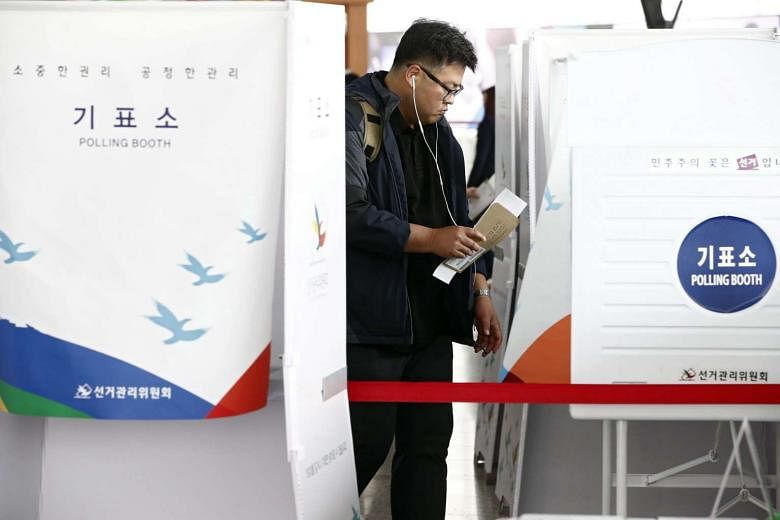SEOUL (AFP) - South Koreans voted on Wednesday (April 13) in legislative elections clouded by North Korean nuclear threats and the multiple challenges facing Asia's fourth-largest economy, as President Park Geun Hye enters the final stretch of her term in office.
Political power in South Korea is firmly concentrated in the presidency and elections to the single-chamber National Assembly are traditionally dominated by local issues.
Rising unemployment, plunging exports and worryingly high levels of household debt have led to criticisms of Ms Park's handling of the economy and, by extension, of her ruling conservative Saenuri Party.
Dissatisfaction is especially high among young people with the jobless rate among those aged from 15 to 29 at record levels.
"If the ruling party is given a majority, the country would have an economic crisis worse than 1997," opposition Minjoo Party head Kim Chong In told supporters at a recent rally.
The nationwide vote kicked off at 6am local time, with 42 million voters eligible to cast their ballots. Results were expected later on Wednesday.
The left-wing opposition has sought to frame the vote as a referendum on Park's economic policies, but has suffered from factional infighting and breakaways that threaten to split the liberal vote to Saenuri's advantage.
Ms Kate Kim, an unemployed 25-year-old college graduate, said that crippling levels of joblessness had persuaded her and many of her previously apathetic friends to vote.
"This is the first time I have voted... our country desperately needs change, especially for young and jobless people like me," Ms Kim said.
All 300 seats in the legislature are up for grabs, with 253 chosen in first-past-the-post constituency elections, and the remaining 47 elected on a separate ballot via proportional representation.
In the last election in 2012, the Saenuri Party won a simple majority of 152 and believes it can improve on that showing this time around.
Analysts say Saenuri's chances have received an extra boost from surging military tensions on the divided peninsula.
National security - a strong polling point for Ms Park and the conservatives - is normally more of an issue for presidential elections, but recent provocations by North Korea have made it a talking point for the assembly vote.
The North conducted its fourth nuclear test in January, followed a month later by a long-range rocket launch that was widely seen as a disguised ballistic missile test.
Concern in the South was seen as benefiting the hawkish Saenuri party, which at one point was optimistically talking of winning up to 180 seats - a crucial 60 per cent majority that would allow it to override opposition attempts to block legislation in the new assembly.
Mr Chung Hae Young, a businessman in Seoul, said he had voted for the ruling conservatives, hailing their hardline stance towards Pyongyang.
"I like how the party handled the North, although it honestly hasn't done a good job with the economy," said the 60-year-old.
But the conservatives have also suffered from internal bickering, particularly over the process for nominating candidates, which led to a number of defections by MPs now running as independents.
"During the nomination process, we failed and disappointed the people. It is entirely our fault," Saenuri Party leader Kim Moo Sung acknowledged last week.
The outcome of Wednesday's vote could have a significant impact on Park, who has less than two years left to serve of her five-year single term.
A strong Saenuri showing would give her more leverage in pushing bills through the assembly, while a dwindling of conservative support would leave her very much a lame duck.
Ms Park has fallen short on most of her key economic promises, a failure she puts down to legislative inaction, but which critics say owes more to skewed priorities, poor decision-making and an authoritarian style of leadership.
Under her presidency, annual economic growth has averaged around 2.9 percent, compared to 3.2 percent under her predecessor Lee Myung-Bak.
Exports, which account for more than half of GDP, have fallen for the past 14 months straight, while household debt has soared to a record US$1 trillion (S$1.34 trillion).

